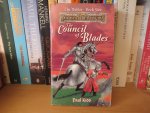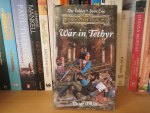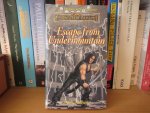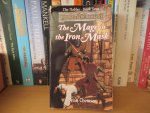#079 The Council of Blades by Paul Kidd (Nobles 5)
Read 22/6/20 to 28/6/20

Book 5, and I thought, at first, it was going to be a cracker- I was wrong, although if you like that kind of thing...
So, there are two stories to be told and later on they get together, which is nice- although at that point the 'silly' has won the day and so it became a slow and ponderous read towards the end- I didn't dig the silly.
First off, the Blade Kingdoms, which come across as a great place to adventure- think Italian (and other) city states in the middle ages (possibly, my history's not that great) some larger than others, each battling to stake their claim to territory- fighting over villages, and crops and mines. But with an order to things- the nobles at the top, lining up their armies like chess pieces on the board, often this act alone is enough to signal the end of the battle, it's orderly and regimented, and rigid, and of course the worst kind of government. Votes (and power) are held and cast depending on the size of your army, the Blade Councils rule the roost. The poor folk suffer regardless, not quite a tyranny- but with the potential. It's also a beautiful land, or at least it is viewed through the eyes of our protagonists, who are all better off then most.
So, maybe 30-40% of the book is about the various Blade Councils and their members- good and bad, taking it in turns to posture, or preen, or else... well, just do what they do. Except the new order wants to grab it all, or at least Ugo Svarezi does- he dresses all in black and rides a black hippogriff (all the clues you need). The conservative, old skool and orderly Prince Mannicci needs to be swept away. Which as it stands would make a great novel, I really like the politics- and the various armies with their historical analogies are all great, particularly when you add a few fantasy troops and tropes in there. I'd read a book about this.
Alas a good 60-70% of the novel is the love story (and extras)- with all the usual fripperies and confusions between Miliana (Minnicci) and Lorenzo (think Leonardo Da Vinci) mad inventor and champion of the poor folk (or so he says). They're all right, but silly- in a Terry Pratchett way (at times) but nowhere near as good/well-written. It's like the author had a silly/daft quotient and once he had met it he went back to the safe and sound, the normal. Then there's the Firebird, Tekoriikii, which is- or who is, just not fantasy- or else too far fantasy for me. Later on in the piece the Firebird defeats 500 hippogriff riders and their mounts- with his call, and odd dance. It's Disney, and to me it doesn't sit well here.
I want the grim and the gritty, I don't mind a short flurry of funny, or light, or a gimmick or a delight- but this is just too daft by a long way however, the bird steals the most heavily guarded of treasures, doesn't talk but can communicate with Miliana, has 99 lives- while at the same time has the disposition of a booby (a preening idiot). I don't like it- in fact I dislike it intensely.
There's also a slew of Da Vinci style inventions et al, which- you might like, I'm okay with most of them but... it just smacks of Pratchett-lite.
The big themes- love (and other things) wins through (sorta), and a bit of power to the people- although we don't really get to see or meet any of the actual, y'know... people, so I'm not sure how much has changed in the end.
There's a daft snail (you read that right) Blade Captain later on- I didn't like that, I think I threw the book across the room and didn't go and fetch it again until sometime the next day. The more I think about it the more I like the idea- a talking snail, somewhere- but not here. To what end- what purpose does it serve. It feels a lot like whimsy, and yet it just makes it harder (for me) to sit the book within the canon, the milieu, or at least alongside what has come before.
So, I really didn't like it- and it took me an age to get to the end, reduced to reading in 20-page bursts because I was so fed up with it. Which is odd because I read Paul Kidd way back when with Expedition to the Barrier Peaks, White Plume Mountain and Queen of the Demonweb Pits- and I seem to remember being so enthused about these locations- and the others featured in the Greyhawk series that I made it my mission to DM these books immediately. Although in truth I had DMed most of them already- remember I'm old skool. Obviously I don't remember how good Mr Kidd's novels actually were (it was all a very long time ago) but they were certainly enough to get my motor running.
Disappointing, overall.
Although, I have actually purchased all but one of the Greyhawk novels, and the Ravenloft novels (a few left to find), and Mystara novels (two missing), and the Planescape novels (one left to find), and the Spelljammer novels. I'm going to do these after I've done with the FR stuff.
I love reading books, which may at this point have become obvious.
Read.




